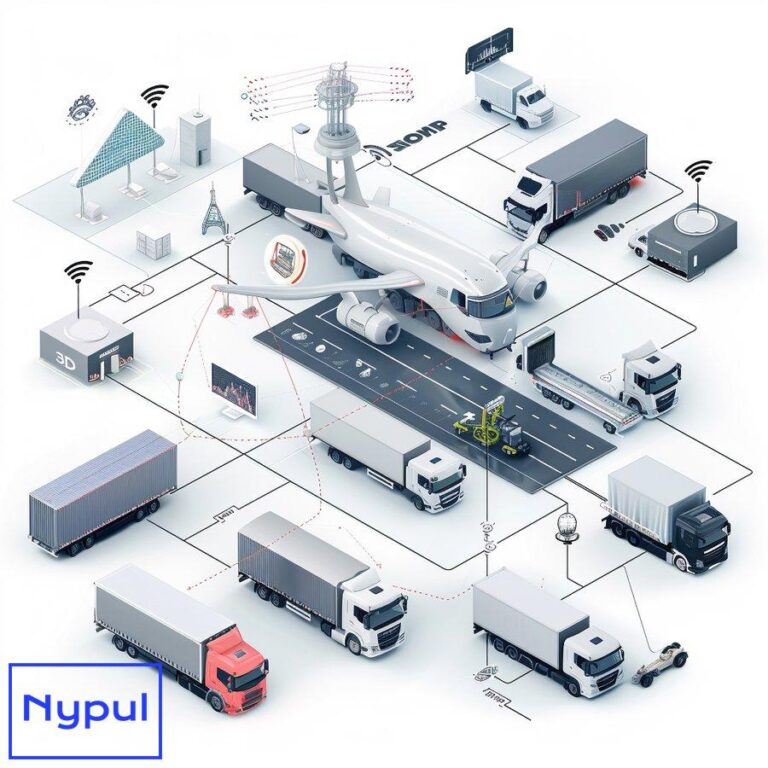What GPS Do Truck Drivers Use
What is Truck GPS and How Does It Differ from Standard GPS?
Truck GPS systems are specialized navigation devices designed specifically for commercial truck drivers and the unique challenges they face on the road. Unlike standard consumer GPS units, truck GPS devices incorporate features and data tailored to the needs of large commercial vehicles.
The core functionality of both truck and standard GPS relies on the Global Positioning System – a network of satellites that provide location and time information to GPS receivers. However, truck GPS systems build upon this foundation with truck-specific mapping data, routing algorithms, and additional features.
Key Differences Between Truck and Standard GPS
Mapping Data: Truck GPS units contain detailed information about truck-restricted routes, low bridges, weight limits, and other obstacles that standard GPS devices lack. This allows truck GPS to generate safe and legal routes for commercial vehicles.
Routing Algorithms: The route calculation in truck GPS accounts for vehicle dimensions, weight, and cargo type to avoid restricted roads and potential hazards. Standard GPS simply finds the fastest or shortest route for passenger vehicles.
Points of Interest: Truck GPS highlights truck-relevant locations like weigh stations, truck stops, and rest areas. Consumer GPS focuses more on general points of interest.
Vehicle Profiles: Truck GPS allows drivers to input their specific vehicle dimensions and load details to further customize routing. Standard GPS assumes a standard passenger vehicle.
Additional Features: Many truck GPS units include extras like fuel logging, hours of service tracking, and integration with electronic logging devices (ELDs). These features are absent from consumer GPS.
Display and Interface: Truck GPS often has larger screens and simplified interfaces designed for easy use while driving a large vehicle. Standard GPS assumes operation in a passenger car environment.
Durability: Truck GPS units are typically built to withstand the vibrations and temperature fluctuations common in a truck cab. Consumer GPS may not be as rugged.
To illustrate these differences more clearly, here is a comparison table:
| Feature | Truck GPS | Standard GPS |
|---|---|---|
| Mapping Data | Includes truck-specific restrictions and hazards | Basic road network only |
| Routing | Accounts for truck size, weight, and cargo | Optimized for passenger vehicles |
| Points of Interest | Truck stops, weigh stations, rest areas | General consumer POIs |
| Vehicle Profiles | Customizable for specific truck dimensions | Single passenger vehicle profile |
| Additional Features | Fuel logging, HOS tracking, ELD integration | Basic navigation only |
| Display | Larger screen, simplified interface | Smaller screen, more complex interface |
| Durability | Built for truck cab environment | Designed for passenger vehicle use |
Truck GPS systems serve as essential tools for commercial drivers, helping them navigate safely and efficiently while complying with regulations and avoiding potential hazards. The specialized nature of these devices makes them invaluable for trucking operations, despite their higher cost compared to standard consumer GPS units.
As the trucking industry continues to evolve, truck GPS systems are likely to incorporate even more advanced features, potentially integrating with other fleet management and telematics systems to provide a comprehensive solution for drivers and fleet managers alike.
What Key Features Should Truck GPS Systems Have?

Truck GPS systems should incorporate a range of features designed to address the specific needs of commercial truck drivers and fleet operators. These features enhance safety, efficiency, and compliance while on the road. Here are the key features that any high-quality truck GPS system should possess:
Truck-Specific Routing
The cornerstone of any truck GPS system is its ability to generate routes tailored for commercial vehicles. This feature takes into account:
- Vehicle dimensions (height, width, length, weight)
- Bridge clearances and weight restrictions
- Truck-restricted roads and highways
- Hazardous materials routing (if applicable)
- Steep grades and sharp curves
Large, Clear Display
Truck GPS units should have screens that are:
- At least 7 inches diagonally
- High-resolution for easy readability
- Glare-resistant for various lighting conditions
- Responsive to touch input, even with gloves
Voice-Guided Navigation
Clear, timely voice prompts help drivers stay focused on the road while receiving navigation instructions. The system should provide:
- Turn-by-turn directions
- Lane guidance for complex interchanges
- Alerts for upcoming hazards or restrictions
Real-Time Traffic Updates
Up-to-date traffic information allows drivers to avoid congestion and delays. This feature should include:
- Live traffic flow data
- Incident reports (accidents, construction, etc.)
- Estimated delay times
- Alternate route suggestions
Points of Interest (POIs)
Truck-specific POIs are crucial for planning stops and managing resources. Important POIs include:
- Truck stops and rest areas
- Weigh stations
- Truck-friendly fuel stations
- Repair facilities
- Loading docks and distribution centers
Customizable Vehicle Profiles
The ability to input and save multiple vehicle profiles enables accurate routing for different trucks or loads. Profiles should include:
- Vehicle dimensions
- Weight (empty and loaded)
- Number of axles
- Fuel type and tank capacity
- Hazardous materials classifications (if applicable)
Hours of Service (HOS) Tracking
Integration with electronic logging devices (ELDs) or built-in HOS tracking helps drivers comply with regulations. This feature should:
- Log driving time and rest periods
- Provide alerts for approaching HOS limits
- Suggest rest stops based on remaining drive time
Fuel Management
Efficient fuel management can significantly impact operating costs. Useful fuel-related features include:
- Fuel consumption tracking
- Fuel price information along routes
- Optimization for fuel-efficient routing
Wi-Fi and Bluetooth Connectivity
Wireless connectivity enables:
- Over-the-air map and software updates
- Integration with smartphones and other devices
- Real-time communication with dispatch or fleet management systems
Durability and Reliability
Truck GPS units must withstand the rigors of life on the road. Key aspects include:
- Rugged construction to handle vibrations and temperature fluctuations
- Reliable performance in various weather conditions
- Long battery life or hardwired power options
User-Friendly Interface
An intuitive interface is crucial for safe operation while driving. The system should offer:
- Large, easy-to-tap buttons
- Simplified menus with quick access to essential functions
- Customizable dashboards for frequently used features
Advanced Safety Features
Additional safety-enhancing capabilities may include:
- Forward collision warnings
- Lane departure alerts
- Speed limit notifications
- Dashcam integration
Trip Planning and Logging
Comprehensive trip management features help drivers and fleet managers optimize operations:
- Multi-stop route planning
- Estimated time of arrival (ETA) calculations
- Trip history logging
- Mileage and fuel expense tracking
By incorporating these key features, truck GPS systems provide drivers with the tools they need to navigate safely, efficiently, and in compliance with regulations. As technology continues to advance, we can expect to see even more sophisticated features integrated into these essential devices, further enhancing their value to the trucking industry.
How Do Truck-Specific Routing Features Benefit Drivers?

Truck-specific routing features in GPS systems provide numerous benefits to commercial drivers, enhancing safety, efficiency, and compliance. These specialized routing capabilities address the unique challenges faced by truck drivers and contribute significantly to smoother, more productive journeys. Here’s a detailed look at how these features benefit drivers:
Enhanced Safety
Truck-specific routing prioritizes driver and public safety by:
- Avoiding low bridges and overpasses that could cause collisions
- Steering clear of roads with weight restrictions that could lead to structural damage
- Bypassing steep grades or sharp curves that pose risks for large vehicles
- Alerting drivers to upcoming hazards specific to trucks
These safety-oriented features reduce the risk of accidents and potential legal issues stemming from inadvertently violating road restrictions.
Improved Efficiency
Efficiency gains from truck-specific routing include:
- Optimized routes that consider truck speed limits and traffic patterns
- Reduced fuel consumption through more direct, truck-appropriate paths
- Minimized backtracking or rerouting due to unexpected restrictions
- Quicker deliveries by avoiding areas unsuitable for trucks
By taking into account the unique characteristics of commercial vehicles, these routing features help drivers complete their routes more quickly and cost-effectively.
Regulatory Compliance
Truck GPS routing assists drivers in staying compliant with various regulations:
- Adhering to designated truck routes in urban areas
- Avoiding roads with hazardous materials restrictions when carrying such cargo
- Factoring in hours of service (HOS) limitations when planning routes
- Guiding drivers to required weigh stations along their route
This compliance-focused routing helps drivers avoid fines and maintain good standing with regulatory bodies.
Stress Reduction
The mental toll of navigating a large vehicle through unfamiliar territory is significantly reduced:
- Drivers can trust that the suggested routes are suitable for their vehicle
- Less worry about encountering unexpected obstacles or restrictions
- Reduced need for constant vigilance regarding potential hazards
- Easier navigation through complex highway interchanges with lane guidance
By alleviating these concerns, truck-specific routing allows drivers to focus more on safe vehicle operation and less on navigation stress.
Cost Savings
Both drivers and fleet operators benefit from the cost-saving aspects of specialized routing:
- Reduced fuel consumption through optimized routes
- Fewer toll roads when toll-free alternatives are available
- Minimized wear and tear on vehicles by avoiding unsuitable roads
- Decreased risk of fines or penalties for violating truck restrictions
These savings can add up significantly over time, improving the bottom line for trucking operations.
Time Management
Effective time management is crucial in the trucking industry:
- More accurate estimated times of arrival (ETAs) based on truck-specific factors
- Easier planning for required rest stops and refueling
- Ability to factor in loading/unloading times at multiple stops
- Real-time adjustments to routes based on traffic conditions
These time management features help drivers meet deadlines and manage their schedules more effectively.
Load-Specific Optimization
The ability to customize routing based on specific load characteristics offers:
- Tailored routes for oversized or overweight loads
- Appropriate paths for trucks carrying hazardous materials
- Consideration of height restrictions for high-cube or double-stacked containers
- Routing that accounts for the turning radius of longer combination vehicles
This level of customization ensures that each trip is optimized for the specific vehicle and cargo configuration.
Improved Customer Service
Truck-specific routing indirectly enhances customer service:
- More reliable delivery times due to optimized routing
- Reduced likelihood of delays caused by navigation errors
- Ability to provide more accurate ETAs to customers
- Fewer instances of property damage when accessing customer locations
These improvements in service quality can lead to increased customer satisfaction and loyalty.
Environmental Benefits
While not always the primary focus, truck-specific routing can have positive environmental impacts:
- Reduced emissions through more efficient routes and less idling
- Minimized impact on residential areas by keeping trucks on appropriate roads
- Lower overall fuel consumption, reducing the carbon footprint of trucking operations
These environmental benefits align with growing industry trends towards sustainability and eco-friendly practices.
By leveraging these truck-specific routing features, drivers can navigate with greater confidence, efficiency, and safety. The cumulative effect of these benefits extends beyond individual drivers to impact the entire trucking operation, from improved bottom lines to enhanced customer relationships. As these routing technologies continue to evolve, we can expect even more sophisticated features that further optimize the trucking experience.
What Are the Top Truck GPS Devices Available in 2024?
The truck GPS market in 2024 offers a range of advanced devices tailored to meet the diverse needs of commercial drivers and fleet operators. These top-tier units combine robust hardware with sophisticated software to provide comprehensive navigation and fleet management solutions. Here’s an overview of some of the leading truck GPS devices available:
Garmin dezl OTR1000
The Garmin dezl OTR1000 stands out with its large 10-inch display and advanced features:
- High-resolution, easy-to-read touchscreen
- Custom truck routing based on vehicle profile
- Built-in PrePass weigh station notifications
- Voice assistant for hands-free operation
- Wireless connectivity for updates and smartphone integration
- Fuel log tracking and reporting
Rand McNally TND 750
Rand McNally’s TND 750 offers a balance of functionality and affordability:
- 7-inch HD display with enhanced graphics
- Advanced lane guidance and junction view
- Lifetime map updates included
- Wi-Fi connectivity for real-time traffic and weather
- Integrated dash cam option
- Fuel logging and management tools
TomTom Trucker 620
The TomTom Trucker 620 focuses on simplicity and reliability:
- 6-inch touchscreen with intuitive interface
- Customizable truck routing
- Real-time traffic updates via built-in SIM card
- Lifetime map updates for North America
- Smartphone connectivity for hands-free calling and messaging
- Magnetic mount for easy installation and removal
Magellan RoadMate RC9485T-LMB
Magellan’s offering combines GPS navigation with an integrated dash cam:
- 7-inch touchscreen display
- Built-in dash cam with continuous loop recording
- Customizable truck routing and multi-stop trip planning
- Free lifetime map updates
- Bluetooth connectivity for hands-free calling
- Junction view with lane assist
Sygic Truck Navigation
While not a standalone device, Sygic’s truck navigation app turns smartphones or tablets into powerful GPS units:
- Offline maps for use without data connection
- Truck-specific routing with real-time traffic
- 3D maps and lane assistance
- Speed limit warnings and camera alerts
- Integration with popular ELD systems
- Fuel price information along routes
To help compare these devices, here’s a feature comparison table:
| Feature | Garmin dezl OTR1000 | Rand McNally TND 750 | TomTom Trucker 620 | Magellan RoadMate RC9485T-LMB | Sygic Truck Navigation |
|---|---|---|---|---|---|
| Display Size | 10 inches | 7 inches | 6 inches | 7 inches | Varies (device-dependent) |
| Custom Truck Routing | Yes | Yes | Yes | Yes | Yes |
| Real-time Traffic | Yes | Yes | Yes | Yes | Yes |
| Lifetime Map Updates | Yes | Yes | Yes | Yes | Yes (with subscription) |
| Integrated Dash Cam | No | Optional | No | Yes | No |
| Fuel Logging | Yes | Yes | No | No | Yes |
| Voice Assistant | Yes | No | No | No | Yes |
| Offline Maps | No | No | No | No | Yes |
| ELD Integration | Yes | Yes | No | No | Yes |
Each of these devices offers unique strengths:
Garmin dezl OTR1000: Excels in screen size and overall feature set, making it ideal for drivers who want a comprehensive, all-in-one solution.
Rand McNally TND 750: Offers a good balance of features and affordability, with the option to add a dash cam for enhanced functionality.
TomTom Trucker 620: Stands out for its built-in SIM card for reliable traffic updates and its user-friendly interface.
Magellan RoadMate RC9485T-LMB: The integrated dash cam sets this unit apart, offering added security and potential insurance benefits.
Sygic Truck Navigation: Provides a flexible, software-based solution that can turn existing devices into capable truck GPS units, ideal for drivers or fleets looking to leverage their current hardware.
When selecting a truck GPS device, consider factors such as:
- Screen size and readability
- Ease of use and interface design
- Frequency of map and software updates
- Additional features like dash cams or fuel logging
- Compatibility with existing fleet management systems
- Initial cost and any ongoing subscription fees
The best choice will depend on specific needs, budget constraints, and personal preferences. Many drivers find it helpful to read user reviews and, if possible, test devices hands-on before making a final decision.
As technology continues to advance, we can expect future truck GPS devices to offer even more integration with other systems, improved accuracy, and enhanced features to further assist drivers in navigating the complexities of commercial trucking.
How Can You Choose the Right Truck GPS for Your Needs?
Selecting the right truck GPS system is a crucial decision that can significantly impact your efficiency, safety, and overall job satisfaction as a commercial driver. With numerous options available, it’s essential to consider various factors to ensure you choose a device that best meets your specific needs. Here’s a comprehensive guide to help you make an informed decision:
Assess Your Specific Requirements

Begin by evaluating your unique needs as a driver or fleet operator:
- Type of trucking (long-haul, regional, local delivery)
- Typical cargo (standard, oversized, hazardous materials)
- Frequency of route changes
- Budget constraints
- Integration needs with existing systems (ELDs, fleet management software)
Understanding these factors will help narrow down the features that are most important for your situation.
Consider Essential Features
Certain features are crucial for most truck GPS systems:Consider Essential Features
Certain features are crucial for most truck GPS systems:
-
Truck-Specific Routing: Ensure the device can customize routes based on your truck’s dimensions, weight, and cargo type to avoid restrictions and hazards.
-
Real-Time Traffic Updates: Look for GPS units that provide live traffic information to help you avoid congestion and delays.
-
Large Display: A larger screen improves visibility and ease of use, especially when navigating complex routes.
-
Voice-Guided Navigation: This feature allows you to keep your eyes on the road while receiving turn-by-turn directions.
-
Points of Interest: Ensure the GPS includes relevant truck stops, weigh stations, and rest areas to facilitate planning.
-
Durability: The device should withstand the rigors of life on the road, including vibrations and temperature changes.
Evaluate User-Friendly Interfaces
A user-friendly interface can significantly enhance your experience:
-
Intuitive Menus: Look for devices with straightforward navigation menus that allow quick access to essential functions.
-
Touchscreen Responsiveness: A responsive touchscreen is vital for ease of use while driving. Ensure it works well even with gloves on.
-
Customization Options: The ability to customize settings and dashboard layouts can improve usability based on personal preferences.
Check for Connectivity Options
Modern truck GPS devices often come with various connectivity features:
-
Wi-Fi and Bluetooth: These options enable over-the-air updates, smartphone integration, and hands-free calling.
-
ELD Integration: If you use electronic logging devices, ensure compatibility to streamline compliance with hours of service regulations.
-
Real-Time Updates: Devices with built-in SIM cards or Wi-Fi capabilities can provide live updates without requiring a smartphone connection.
Read Reviews and Seek Recommendations
Before making a purchase, research user experiences:
-
Online Reviews: Check reviews from other truck drivers to gauge reliability, ease of use, and customer support experiences.
-
Word of Mouth: Ask fellow drivers or fleet managers for recommendations based on their experiences with specific devices.
-
Professional Forums and Groups: Engage in discussions within trucking forums or social media groups to gather insights from a broader community.
Consider Budget Constraints
While investing in a quality truck GPS is essential, it’s important to balance features with your budget:
-
Initial Cost vs. Long-Term Value: Consider not just the upfront cost but also the potential savings from improved routing efficiency and reduced fuel consumption.
-
Subscription Fees: Some devices require ongoing subscriptions for map updates or traffic services. Factor these into your total cost of ownership.
-
Warranty and Support Options: A good warranty can provide peace of mind. Look for manufacturers that offer reliable customer support in case issues arise.
Test Before You Buy
If possible, test the GPS unit before making a purchase:
-
In-store Demonstrations: Visit retailers that allow you to interact with the device to evaluate its interface and functionality firsthand.
-
Return Policies: Check if the retailer offers a return policy in case the device does not meet your expectations after trying it out in real-world conditions.
Choosing the right truck GPS system involves careful consideration of your specific needs, essential features, user-friendliness, connectivity options, budget constraints, and thorough research. By taking these steps, you can find a device that enhances your navigation experience and contributes positively to your overall efficiency as a driver or fleet operator.
What Benefits Do Truck GPS Systems Provide for Drivers?
Truck GPS systems offer numerous benefits that enhance the overall driving experience for commercial drivers. These advantages extend beyond mere navigation, impacting safety, efficiency, compliance, and even job satisfaction. Here’s an in-depth look at the benefits provided by truck GPS systems:
Increased Safety
Safety is paramount in trucking, and truck GPS systems contribute significantly by:
-
Providing truck-specific routing that avoids low bridges, weight-restricted roads, and hazardous areas.
-
Offering real-time alerts about road conditions, accidents, or construction zones that could impact travel.
-
Enhancing situational awareness with lane guidance and turn-by-turn directions tailored for large vehicles.
These safety features help reduce accidents and ensure compliance with regulations regarding vehicle restrictions.
Improved Efficiency
Efficiency gains are crucial for maximizing productivity in trucking operations:
-
Optimized routing minimizes travel time by avoiding congested areas and selecting the most efficient paths.
-
Real-time traffic updates allow drivers to adjust routes dynamically based on current conditions.
-
Customizable vehicle profiles ensure that routes are tailored specifically to the driver’s truck dimensions and load type.
These factors lead to faster deliveries and reduced fuel costs over time.
Regulatory Compliance
Compliance with industry regulations is essential for avoiding fines and maintaining operational integrity:
-
Truck GPS systems assist drivers in adhering to hours of service (HOS) regulations by tracking driving time and suggesting appropriate rest stops.
-
They provide alerts for required weigh stations along routes to ensure compliance with state regulations.
By facilitating adherence to these regulations, truck GPS systems help maintain good standing with regulatory agencies.
Cost Savings
The financial benefits of using a truck GPS system can be substantial:
-
Reduced fuel consumption through optimized routing leads directly to lower operating costs.
-
Avoiding toll roads when possible can save significant amounts over time.
-
Fewer fines or penalties associated with route violations contribute to overall cost savings.
These financial advantages can significantly impact a trucking operation’s profitability.
Enhanced Customer Service
Reliable delivery schedules supported by effective navigation lead to improved customer satisfaction:
-
Accurate estimated times of arrival (ETAs) allow businesses to communicate effectively with clients regarding delivery schedules.
-
Fewer delays due to navigation errors enhance reliability in meeting customer expectations.
By improving service quality through reliable navigation solutions, trucking companies can foster stronger relationships with clients.
Stress Reduction
Driving a large commercial vehicle can be stressful; however, truck GPS systems alleviate some of this pressure:
-
Trusting in accurate routing reduces anxiety about getting lost or encountering unexpected obstacles.
-
Voice-guided navigation allows drivers to focus on driving rather than constantly checking maps or screens.
This reduction in stress contributes positively to driver well-being and job satisfaction.
Time Management
Effective time management is critical in the fast-paced world of trucking:
-
Truck GPS systems provide accurate ETAs based on real-time data, allowing drivers to plan their schedules more effectively.
-
They facilitate multi-stop route planning that accounts for loading/unloading times at various locations.
By optimizing time management capabilities, these systems help drivers maximize productivity throughout their shifts.
Load-Specific Routing
For drivers handling specialized cargo or oversized loads, load-specific routing is invaluable:
-
Truck GPS systems consider height restrictions for tall loads or weight limits for heavy cargo when calculating routes.
-
This ensures safe passage through areas where standard vehicles may not be allowed.
Such tailored routing enhances operational efficiency while ensuring compliance with local regulations regarding oversized loads.
Environmental Benefits
While not always the primary focus, using truck GPS systems can have positive environmental impacts:
-
More efficient routing reduces fuel consumption and emissions associated with idling or unnecessary detours.
-
Minimizing travel distances contributes positively toward sustainability goals within the trucking industry.
These environmental benefits align well with growing industry trends toward eco-friendly practices.
In summary, truck GPS systems provide extensive benefits that enhance safety, efficiency, compliance, cost savings, customer service quality, stress reduction, time management capabilities while also considering load-specific needs. By leveraging these advantages effectively through technology adoption within their operations—drivers can navigate their routes confidently while maximizing productivity on every journey they undertake.
What Challenges and Limitations Should You Consider with Truck GPS?
While truck GPS systems offer numerous advantages for commercial drivers, they also come with challenges and limitations that users should be aware of before relying solely on these devices. Understanding these potential drawbacks will enable drivers to make informed decisions about their navigation tools. Here’s a detailed exploration of some common challenges associated with truck GPS systems:

Dependence on Technology
One significant challenge is the reliance on technology for navigation:
-
Technical failures such as hardware malfunctions or software glitches can disrupt navigation capabilities during critical moments.
-
Drivers may become overly dependent on GPS guidance rather than developing their navigational skills or understanding road layouts.
To mitigate this risk, it’s essential for drivers to maintain basic map-reading skills as a backup plan when technology fails.
Limited Coverage in Rural Areas
Truck GPS systems may struggle in areas lacking robust cellular coverage:
- In remote regions where signal strength is weak or nonexistent—real-time traffic updates may be unavailable leading to potential delays due unforeseen obstacles ahead.
To address this issue effectively—drivers should consider using offline maps whenever possible while planning trips through less populated areas where connectivity might be compromised.
Cost Considerations
While many truck GPS units offer valuable features—cost can be a concern:
- High-quality devices often come at a premium price point; additional subscription fees may apply for ongoing map updates or traffic services which could strain budgets over time.
Drivers must weigh these costs against potential savings gained from improved efficiency before committing fully towards any particular solution available today within this market space.
Learning Curve
Some advanced truck GPS models come packed with features that may require time investment before becoming proficient users:
- Complex interfaces might overwhelm new users unfamiliarity leading them frustrated when attempting navigate through various functionalities offered by device itself—especially if they’re accustomed simpler alternatives previously used instead!
Investing time into learning how best utilize all available options will ultimately pay off dividends down line!
Inaccurate Mapping Data
While most reputable brands strive maintain accurate mapping data—errors do occur occasionally leading potential issues during travels:
- Outdated information regarding road closures or construction zones could mislead drivers causing unnecessary detours resulting lost time & fuel expenses incurred along way!
Regularly updating maps ensures access latest information but still requires vigilance from operators themselves monitor changes occurring within their respective regions regularly too!
By being aware of these challenges associated specifically related usage Truck-GPS-systems—drivers will better equipped navigate complexities involved modern-day logistics successfully while maximizing benefits derived from utilizing such technologies overall!
In conclusion—while there are undeniable advantages offered by incorporating dedicated-truck-GPS-systems into daily operations—it’s important remain cognizant limitations present alongside them too! Balancing both perspectives enables informed decision-making ultimately leading successful outcomes across board whether individual operator fleet manager alike!





